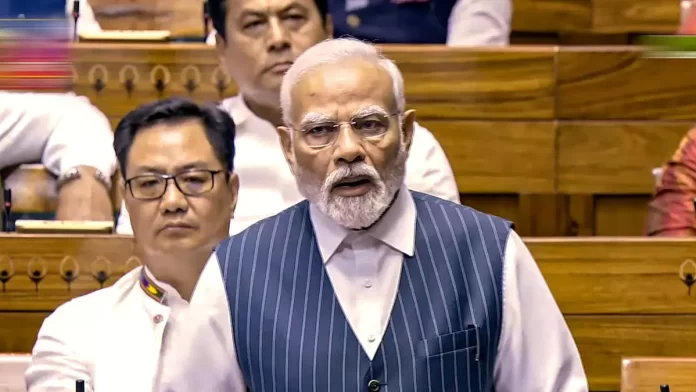New Delhi: In a move set to have a wide impact on Indian electoral politics, the Narendra Modi government Tuesday introduced the 128th Constitutional Amendment Bill, 2023, to bring in 33% reservation for women in the Lok Sabha and all state Legislative Assemblies. The Bill extends the quota to the seats reserved for SC/STs.
Calling himself “the chosen one for empowering and strengthening women”, Prime Minister Modi urged the five-day special session of Parliament – that met in the new building on Tuesday – to pass the Bill, dubbed by the government as the ‘Narishakti Vandan Adhiniyam’, unanimously.
The reservation for women, however, will kick in only after the completion of the delimitation exercise based on the first Census conducted after the passage of the Bill, which puts off its date to around 2029. The Bill mandates women’s reservation for 15 years from the commencement of the Act, with Parliament empowered to extend it further. Rotation of seats reserved for women will happen only after subsequent delimitation exercises, to be determined by Parliament by law.
The Bill introduced in the Lok Sabha on Tuesday is similar to the legislation passed by the Rajya Sabha in March 2010 under the Congress-led UPA government on all aspects but this – its linking to the delimitation process. The Opposition seized on this, accusing the government of “fooling the people” by not bringing in the reservation immediately, and introducing the Bill solely with an eye on the 2024 Lok Sabha polls.
Talking about the Bill, which will be taken up by the House on Wednesday, Modi said in the Lok Sabha: “On this historic occasion in the new Parliament building, as the first agenda on the first day, we have made a call for transformation. We, all the MPs, should come together to open the doors for the empowerment of Nari Shakti.”
Union Minister of Law and Justice Arjun Ram Meghwal, who introduced the Bill, said that once passed, it will take the number of women MPs in the Lok Sabha, as per its present strength of 543, to 181. The current House has 82 women MPs.
The Bill, which seeks to insert clause (1) in Article 330 A to reserve seats for women, says by another clause that one-third of the seats reserved for SCs and STs in the Lok Sabha be reserved for women from these categories. A third clause talks about keeping aside, as nearly as possible, one-third of the total seats filled by direct election to the Lok Sabha, for women. The quota will not apply to the Rajya Sabha or state Legislative Councils.
The BJP is gambling that the legislation, even if implemented later, would give the party a boost among women voters – a core support base of the party – in the coming Assembly elections in Madhya Pradesh, Chhattisgarh, Rajasthan, Mizoram and Telangana, plus the Lok Sabha polls next year.
It would be another notch in Modi’s prime ministerial legacy, BJP leaders added.
With the passage of the Bill almost certain, given that the parties opposed to women’s quota earlier have also come around now, the PM said amidst thumping of desks by both sides on Tuesday: “The Narishakti Vandan Adhiniyam will further strengthen our democracy. I congratulate mothers, sisters and daughters of the nation… I assure all that we are committed to making this Bill into law.”
In the Rajya Sabha, where the Opposition numbers are more robust, Modi appealed to MPs to pass the Bill unanimously. “Tomorrow it will be discussed in the Lok Sabha and, after that, it will come to the Rajya Sabha. I am requesting all of you… it is such an issue that if we take it forward unanimously, it would multiply its power,” he said.
Given that it is a Constitutional amendment Bill, it needs to be passed by both the Houses with “special majority” – that is, a majority of the total members of each House, plus a majority of two-thirds of the House present and voting – and to be ratified by at least half the state Assemblies.
With the government pulling another surprise and bringing in the women’s quota Bill without any announcement, the Congress tried to claim credit for the legislation and questioned the secrecy around it. It also asked why the reservation was not being brought in immediately.
This invited sharp criticism from Home Minister Amit Shah, who posted on X: “Across the length and breadth of India, people are rejoicing at the introduction of the Nari Shakti Vandan Adhiniyam in Parliament… Sadly, the Opposition is unable to digest this. And, what is more shameful is that except tokenism, the Congress has never been serious about women’s reservation. Either they let legislation lapse or their friendly parties prevented the Bill from being tabled.”
In his speech in both the Houses, the PM recalled the several failed attempts made earlier to pass the women’s Bill, including under the Atal Bihari Vajpayee government.
“Mahilaon ko adhikaar dene ka, mahilaon ki shakti ka upyog karne ka woh kaam, shaayad ishwar ne aise kayi pavitra kaam ke liye mujhe chuna hai (Giving women their rights, using their powers well… perhaps God has chosen me to undertake such noble works).”
Observing the growing contribution of women in every sector, the PM called for including more of them in policy-making and spoke about the women-centric steps taken by his government, including Ujjwala Yojana, access to toilets under Swachh Bharat Mission, and financial inclusion through Mudra Yojana. He said rules were changed to allow employment of women in the mining sector and the doors of the Sainik schools were opened to girls. “Our daughters have the ability and they should get opportunities. The era of ifs and buts in their lives is over,” he said, adding that women-led development was “a major point of discussion at the G20”.
The statement of objectives and reasons for the Bill also refers to the Modi government’s schemes meant for women. “However,” it said, “true empowerment of women requires greater participation of women in the decision-making process as they bring different perspectives and enrich the quality of legislative debates and decision-making.”








